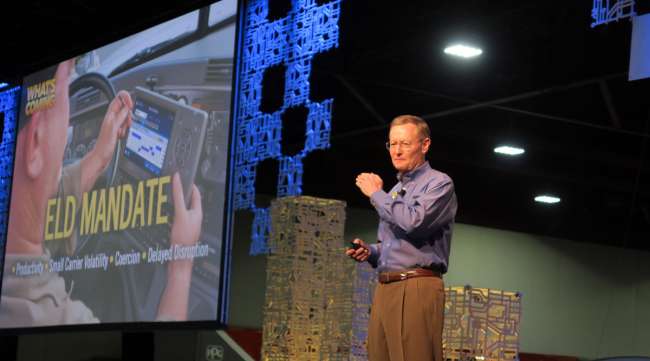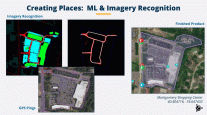Staff Reporter
McLeod Urges Fleets to Practice Visibility, Caution as ELD Mandate Looms

ATLANTA — With the federally mandated deadline for the use of electronic logging devices drawing near, fleets should take a hard look across their operations to ensure that they and their partners are ready, said Tom McLeod, CEO of McLeod Software.
“This makes it extremely important that your planners have visibility,” he said during his keynote address at the McLeod Software User Conference here Sept. 18. “This is a good time to get choosy about the freight you want to deliver. Get in front of your shippers. Listen to them. Choose your partners carefully.”
The ELD rule, due to take effect Dec. 18, mandates that commercial drivers who are required to record their hours of service do so with the devices.
Certain industry representatives, including smaller trucking companies and owner-operators, have resisted the rule. The Owner-Operator Independent Drivers Association has filed lawsuits with the Supreme Court challenging the mandate. The Commercial Vehicle Safety Alliance announced Aug. 28 that vehicle inspectors may issue citations to motor carriers operating vehicles without ELDs beginning Dec. 18 but said it will not place vehicles out of service until April 1.
https://t.co/7wsFKAyMkF pic.twitter.com/jVA7rPbosG — FMCSA (@FMCSA) September 17, 2017
However, McLeod said that 70-80% of smaller companies have yet to implement the devices and may face a tough road ahead if they don’t soon adapt.
“Some of them are not going to make it. It’s a learning curve. It’s not just a switch you can throw,” McLeod said. “The companies that are waiting until the last minute typically aren’t the best-managed companies.”
Since February 2016, ELD manufacturers have been able to register and certify their devices with the Federal Motor Carrier Safety Association, and motor carriers could elect to use ELDs listed on the agency’s website.
McLeod said that some drivers will simply leave the industry rather than learn how to use ELDs and added that those companies waiting until as close to the start date as possible to adopt the devices risk going “belly-up.”

Shuster
Speculation about a potential delay of the mandate swirled in July, when the House Transportation Committee attached a directive to a Transportation, Housing and Urban Development appropriations bill calling for review of the technology platforms of ELD suppliers. A last-ditch effort to delay the ELD mandate was defeated Sept. 6. Sixty-seven Republicans, including Rep. Bill Shuster (R-Pa.), chairman of the Transportation and Infrastructure Committee, joined 179 Democrats to reject a proposal that would have denied funding in fiscal 2018 to enforce the rule on ELDs.
Additionally, McLeod said trucking companies will have to learn to manage an influx of data, specifically “smart” technologies such as sensors on trailers, driver wearables and video cameras, generate reams of data.
Although he believes that completely self-driving trucks are years away, he said that his company has initiated conversations with fleets and engineering teams to educate them on planning for autonomous vehicle applications.
“All these things change the way you manage your company. You want to take advantage of the age of information. If you don’t do it, somebody else will,” McLeod said.
One piece of information vital to drivers is parking availability. Mark Cubine, McLeod’s vice president of marketing, said that while the company has yet to develop technology that tracks it, the issue is on McLeod’s radar. A shortage of truck parking nationwide was the fourth issue on the American Transportation Research Institute top 10 concerns facing the industry in 2016.
“We know the things that frustrate drivers,” Cubine said. “We can do a whole lot more in improving drivers’ experience.”



